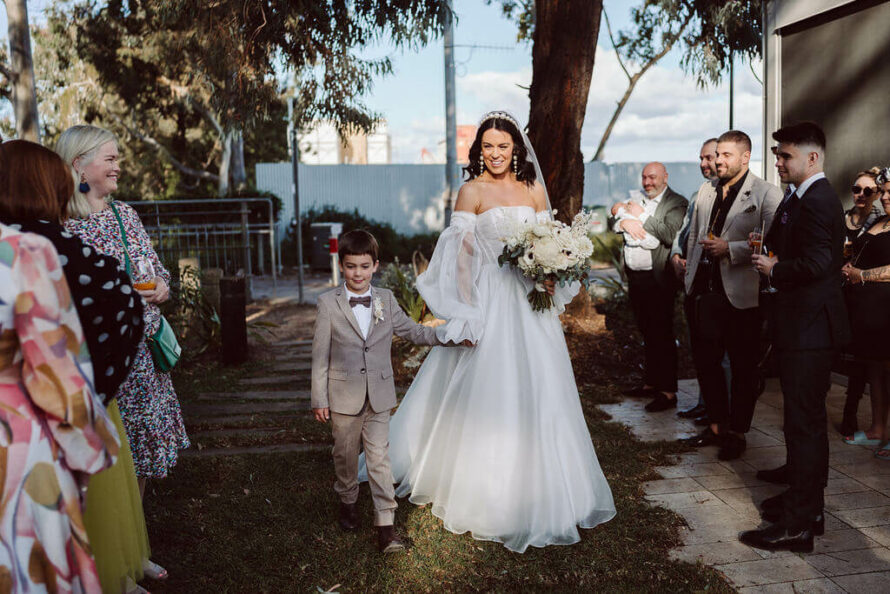Weddings can be a delicate affair at the best of times, but throw in divorced or separated parents – especially ones who didn’t ‘consciously uncouple’ – and the tension can ratchet up.
In an ideal world, everyone would put that aside and make an effort just to get along, but this isn’t always how it plays out. So here’s some ways to work around any potential problems, and ensure you still get your dream day.
Set expectations for behaviour
Ideally, you want everyone to get along during the wedding planning process. And it’s tempting to tiptoe around thoughts and feelings to avoid any drama. But treating your parents like children who need to be handled with kid gloves does no one any favours. So, tell them firmly – but kindly – right from the start that you need them to put aside their differences and focus on the wedding in an appropriate manner. Tell them you will be respectful of their strained relationship, but that you have no interest in getting involved in arguments. Then, if they do go to battle, walk away and refuse to either engage, or take sides. On the flip side, you also need to act like an adult yourself. This means being very aware and sensitive of their feelings, avoiding anything that could be a sore spot for them, and not trying to force a friendship by forcing them into each other’s presence when it’s not necessary. Do that and you’re well on the way to keeping the attention where it belongs – on you and your big day.
Show your appreciation as often as you can
There is, sadly, plenty of potential for divorced parents to feel a little sad or slighted in wedding planning. Perhaps one can afford to contribute more to costs than the other, or you’re closer to one than the other so call on them for more input. However the cards fall, it can be a tricky balance to strike. So the easiest solution is just to make sure you’re vocal in your appreciation of anything either one of them does, whether it’s helping you make program fans for the ceremony or shelling out on a florist you’ve always dreamed of using. Plus, it’s a good chance to remind them that, above all else, you’re just happy to share such a momentous milestone with them.[ew-supplier-carousel]
Be logical about things
There’s plenty of times in a wedding where you will need to throw ‘usual practice’ out the door to cater for divorced parents. So, look to do it with finesse and respect. For example, the bride’s parents would normally sit together at the reception, ditto for the groom’s, but that’s not going to pass muster here. So the easiest idea is to separate them at different tables but make sure they both enjoy a good position with a great view of the head table. Ditto for the ceremony, where they could be seated a pew apart – with our without new partners. The key is to talk them through your plans in advance just to ensure there’s no potential for misunderstanding on the day.
Remember that they want what’s best for you
You know your parents love you and only want the best for you. But since they’re divorced, they may well have quite different notions of what the “best” actually is – and might push to get you to accept their opinion. But stand strong and remember that it’s your day, so you deserve to plan it your way. Just make sure that when you decide on a divisive issue, you clearly explain your reasons to the person who’s opinion you didn’t take, so that they understand it’s not about ‘siding’ with anyone, it’s about being true to yourself.
Brief your vendors
To prevent any hiccups on the day, it’s also a good idea to have an advanced briefing with people who may need to know how to navigate family relationships. This could mean, for example, telling your photographer that they should stand your parents apart or telling the videographer not to film either of their faces when the other is giving a speech. It’s also a good idea to think through more specific tricky issues. For example, is your dad remarried but your mother isn’t? Well, ask a groomsman to pair her up for the parents’ dance at the reception. They don’t need to make a big deal about it, just do it naturally so there’s no awkwardness and no one feels left out.
Devote some time just to them
There’s a laundry list of jobs and events that go into planning a wedding, so take advantage of it to schedule some great one-on-one time with each parent. Take your mother wedding gown shopping and then have a nice girls lunch afterwards. Or hit your father up to join you at a wedding expo to start getting an idea of what’s in trend, followed by dinner out. In truth it doesn’t matter where you go and what you do, it’s about making the time to make time for them.
If a fight happens, it’s not about you
If your parents are fighting, chances are their arguments have nothing to do with you. In fact, it’s likely that some of the same issues behind their divorce are raising their head again. So if it looks like you might get caught in the middle, best bets are either just to ignore it, or to remind them you have no interest in their difficulties and tell them to leave you out of it. The most important strategy, however, is to stay calm. There is no need to get worked up over something that has history and that you can’t change. After all, you have a wedding to plan.
Share the honours
Because of tradition, there’s some tasks that are generally given to your mother or your father to take responsibility for as a united parental unit. But since this no longer exists, you may need to give the classic approach a tweak. For example, fathers are often the ones to give a toast or make a speech, but in this case you might want to invite both your parents to contribute. And similarly, instead of being walked down the aisle by Dad, you might ask them both to give you an honour escort. Even if they decline, it’s worth at least making the offer so they understand they have equal importance in your big day.
Treat new partners like a careful jigsaw
Often times, the inclusion or omission of new partners can be the biggest source of tension for divorced parents, especially if they were somehow involved in the destruction of your parents’ own relationship. So, you need to tread carefully with good communication, and maybe understand that some feelings can’t be put aside – which means you need to put yourself in their shoes. If you were your father, for example, would you want your mother’s new boyfriend at the ceremony if they were around before the divorce? Well, it would depend on the timing, of course. If it only happened a year ago, the wounds may still be fresh, whereas if it happened 10 years ago, it’s probably time to get over it. Or, maybe, things can be eased by encouraging him to also bring along a friend for company. In other words, timing and expectation are everything, so you need to have conversations up front, work out how you feel and who you do and don’t want there, and then communicate your decisions. Everyone may not like it, but again, it’s your day so you get to invite who you want to invite.
And finally, remember that your marriage is not their marriage
Unlike genes and eye colour, bad marriages are not passed down. A healthy marriage is something you build, not inherit, so it’s up to you and your spouse how you do that to ensure a better outcome for yourselves. And we can guarantee your parents will be there to help with this in any way they can, if only to spare you the pain they themselves once went through.


